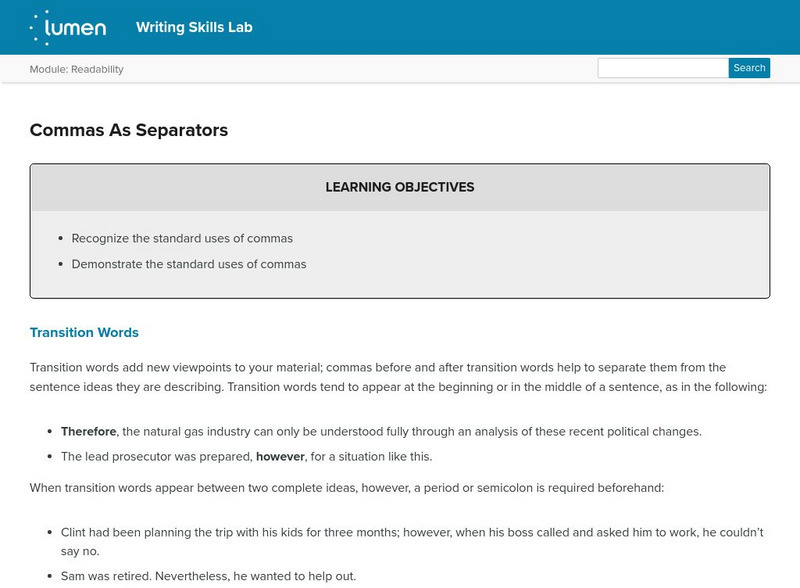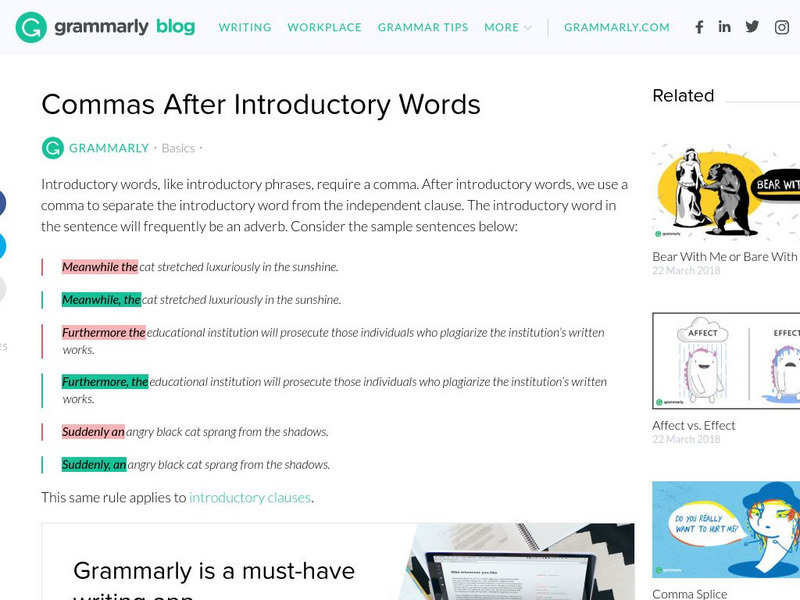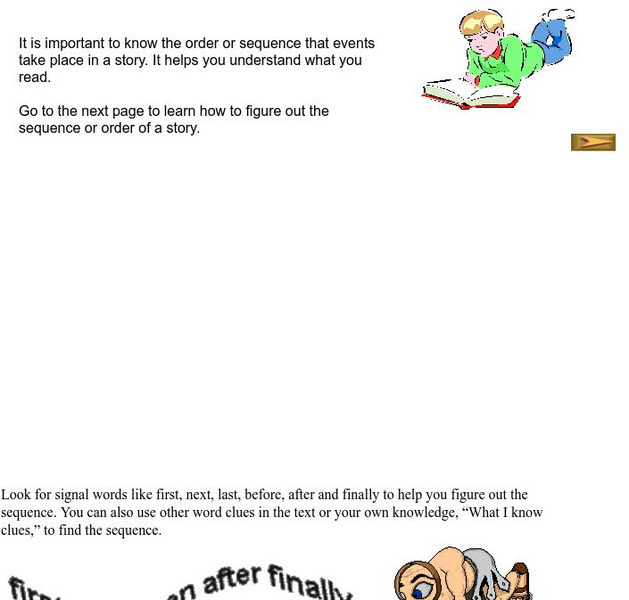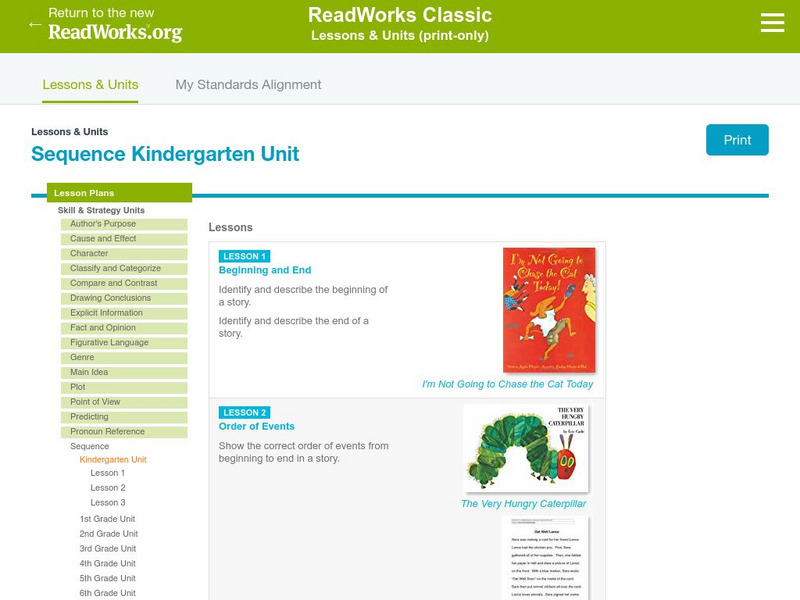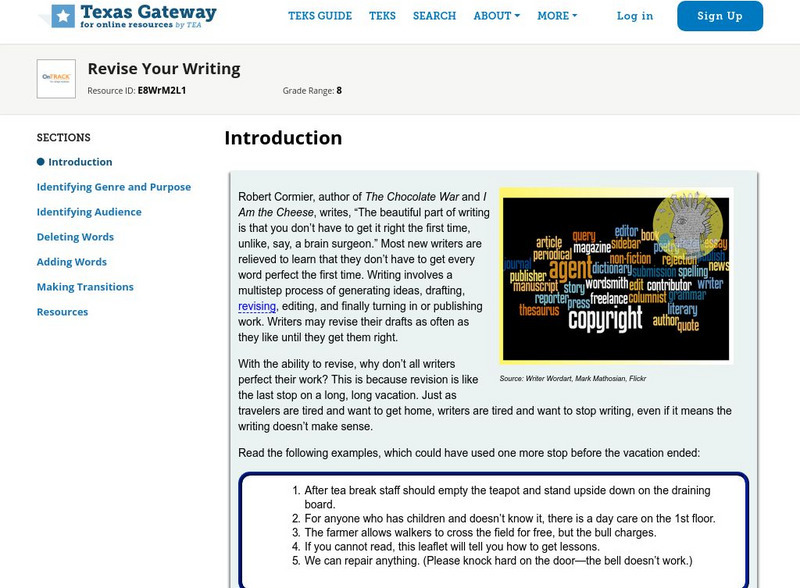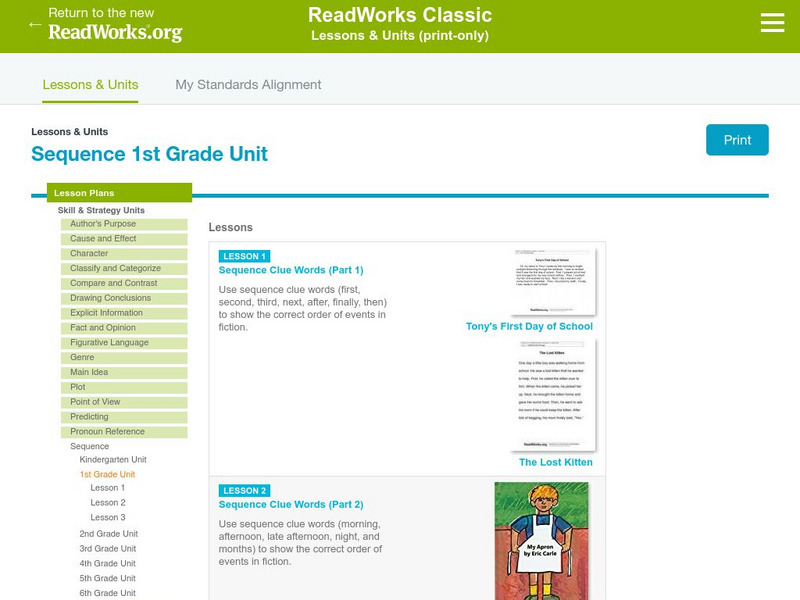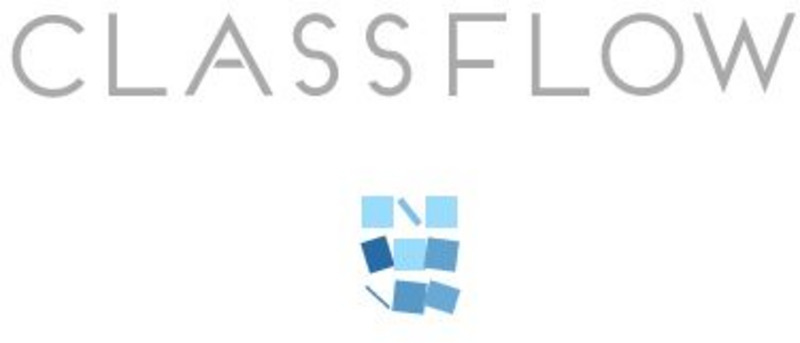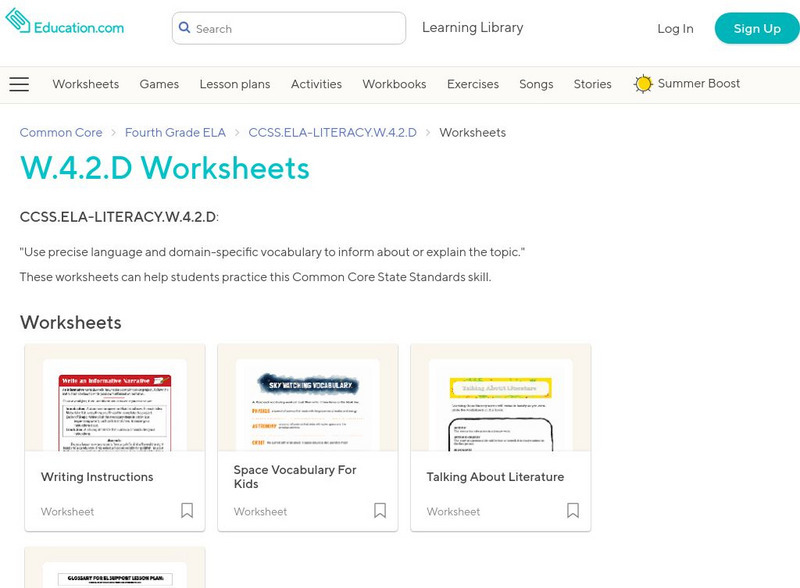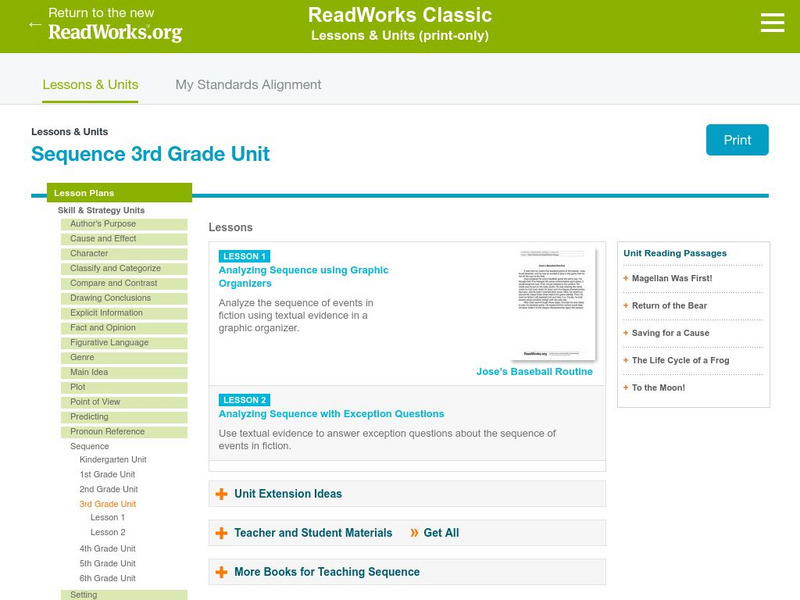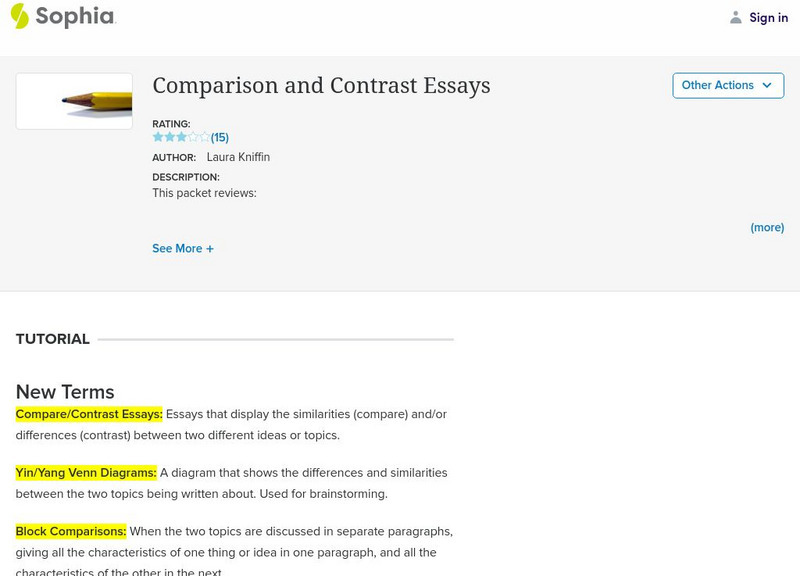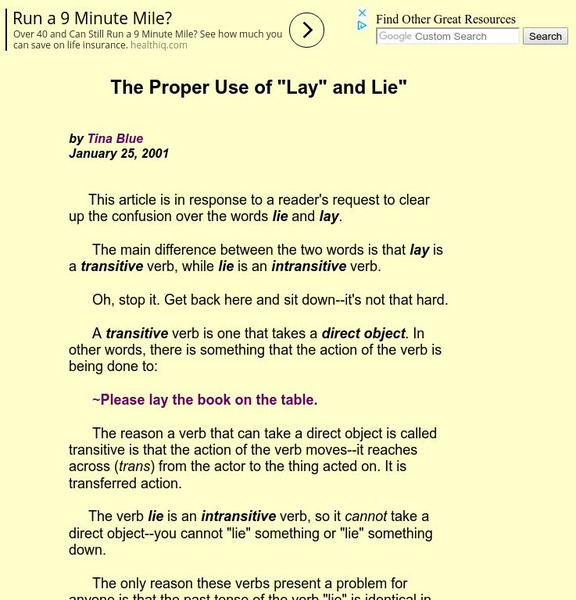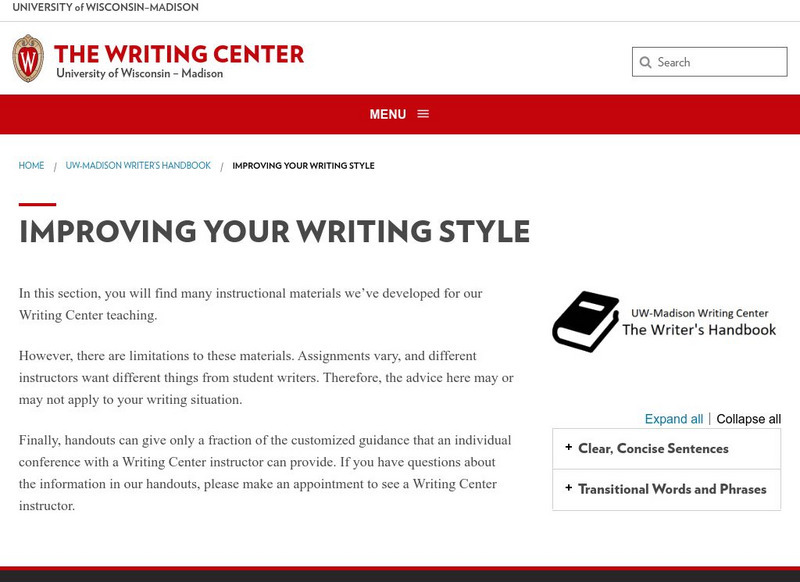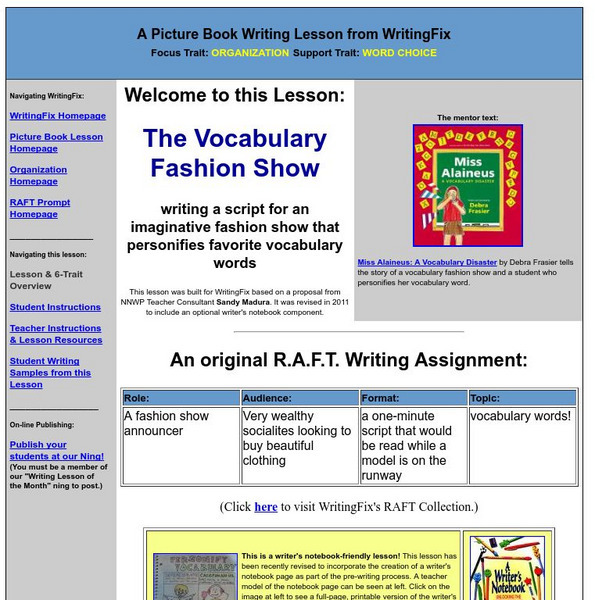Lumen Learning
Lumen: Readability: Commas as Separators
This lesson focuses on recognizing and demonstrating the use of commas as separators including with transition words, descriptive phrases, and adjacent items. It also provides a practice activity.
Indiana University
Indiana University East: Writing Center: Transitions: Understanding Signal Words
This resource page provides nine lists of signal words and what they mean. Covers words that show time, addition, contrast, comparison, illustration, location, cause and effect, conclusion or summary, and emphasis or clarification.
Grammarly
Grammarly Blog: Commas After Introductory Words
This Grammarly Handbook resource explains how to use commas after introductory elements. Numerous examples of commas after introductory phrases, introductory clauses, and introductory transitions are provided in this resource.
Beacon Learning Center
Beacon Learning Center: Sequence of Events
Build sequencing skills by looking at transition words like first, next, then, and finally. Read four short paragraphs and use the transition clues to put the events in the correct order. Then use these words while typing an original...
Read Works
Read Works: Sequence Kindergarten Unit
[Free Registration/Login Required] A series of three lesson plans designed to teach students to recognize the beginning and ending of a story and use word clues to put story events into the correct sequence. Lessons are based on the...
Sophia Learning
Sophia: Writing Effective Topic Sentences
This tutorial focuses on topic sentences using two slideshows. The first defines topic sentences, discusses purpose and placement, and provides a sample thesis statement followed by accompanying topic sentences samples. The second...
Texas Education Agency
Texas Gateway: Revise Your Writing
[Accessible by TX Educators. Free Registration/Login Required] In this lesson, you will learn to revise your writing for clarity. You will begin by reviewing some major considerations for revision: genre, purpose, and audience. You will...
ClassFlow
Class Flow: Connectives
[Free Registration/Login Required] This flipchart investigates connecting words and phrases, providing examples with different kinds of text. It helps students to identify the connecting words by helping them classify the various examples.
Read Works
Read Works: Sequence 1st Grade Unit
[Free Registration/Login Required] This site provides a series of three lesson plans designed to teach students to recognize and use word clues to put story events into the correct sequence and retell the story accordingly. Lessons are...
The Write Place
Literacy Education Online: Cohesion: Using Repetition and Reference Words
This site gives a brief overview of how to achieve cohesion or coherence in writing. It explains how the repeating of key words and using reference words help tie ideas together. Use link in first paragraph to find charts of transitional...
Sophia Learning
Sophia: Cause and Effect Papers: Key Elements: Lesson 2
This lesson goes over words, phrases, and key elements that are included in cause and effect papers. It is 2 of 2 in the series titled "Cause and Effect Papers: Key Elements."
ClassFlow
Class Flow: Positional Words
[Free Registration/Login Required] This lesson uses positional words to place objects on a background.
Education.com
Education.com: W.4.2.d Worksheets: Use Precise Language and Vocabulary
[Free Registration/Login Required] A site with links to 4 worksheets that can be downloaded and printed for student use while building skills with standard W.4.2.D: Use precise language and domain specific vocabulary to inform about or...
Robin L. Simmons
Grammar Bytes: The Conjunctive Adverb
Printable information is provided that demonstrates how to identify a conjunctive adverb in the context of a sentence.
TES Global
Blendspace: Cause and Effect
This eleven-part Blendspace is designed to be used while teaching students how to analyze cause and effect. Links include reference sheets, a SMART Notebook Lesson, posters, practice worksheets, and guided practice opportunities.
Read Works
Read Works: Sequence 3rd Grade Unit
[Free Registration/Login Required] This website provides a series of two lesson plans designed to teach students to create a graphic organizer showing the sequence of events in a fiction text. The lessons include ideas for direct...
Sophia Learning
Sophia: Comparison and Contrast Essays
This lesson focuses on the comparison and contrast essays; it defines new terms: compare/contrast essay, yin/yang Venn diagram, block comparison, and point by point comparison. It also provides a slideshow which defines and discusses the...
Grammar Tips
Grammar Tips: The Proper Use of "Lay" and "Lie"
Check this brief explanation of how to tell the difference between lay, a transitive verb, and lie an intransitive verb, and use them properly in English grammar.
Capital Community College Foundation
Guide to Grammar and Writing: Principles of Composition
If you are a teacher OR a student looking for a well-informed website on elements of the writing process, you are in luck! This site from the Capital Community College is very comprehensive and easy-to-navigate. From grammar basics to...
University of Wisconsin
University of Wisconsin: Writing Center: Improving Your Writing Style
If you are looking for ways to make your writing clearer and more concise, check out this site. Many helpful hints are given here. Information can be downloaded in PDF format. L.11-12.3a Syntax
Sophia Learning
Sophia: Classification Papers: Key Elements
This lesson goes over words, phrases, and key elements that are included in classification papers.
Sophia Learning
Sophia: Comparison Papers: Key Elements
This lesson goes over words, phrases, and key elements that are included in comparison contrast papers.
Writing Fix
Writing Fix: The Vocabulary Fashion Show
Inspired by Debra Frasier's clever vocabulary fair from her book, Miss Alaineus: A Vocabulary Disaster, individual students will imagine what a vocabulary fashion show would be like. Assuming the role of a fashion show announcer,...
E Reading Worksheets
E Reading Worksheets: Patterns of Organization: Spatial
This site provides an explanation of the spatial text structure. A diagram is provided to supplement the explanation, along with numerous transition words associated with arrangement in space.
Other popular searches
- Transition Words Activities
- Transition Words and Phrases
- Transition Words List
- Transition Words in Writing
- Using Transition Words
- Writing Transition Words
- Transition Words for Writing
- Recognizing Transition Words
- Use Transition Words
- Time Order Transition Words
- Transition Words Lessons
- Transition Words Language Arts
